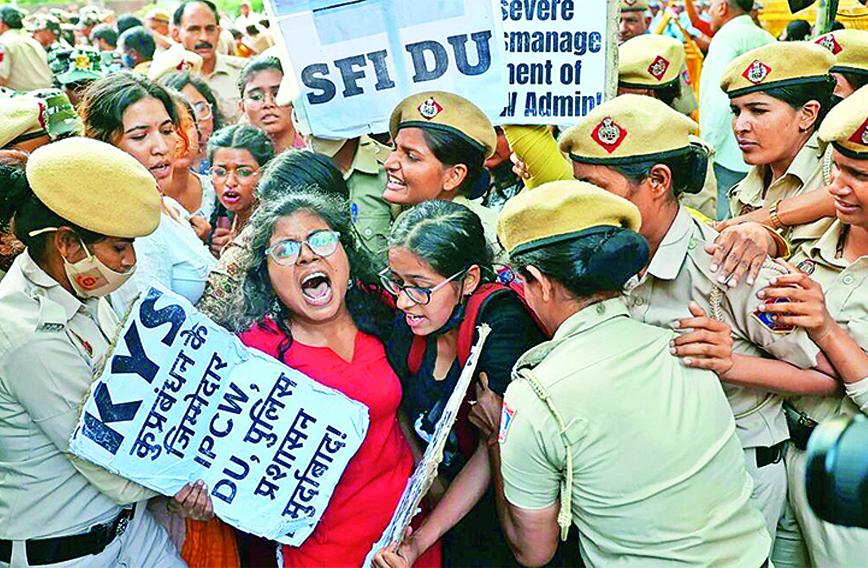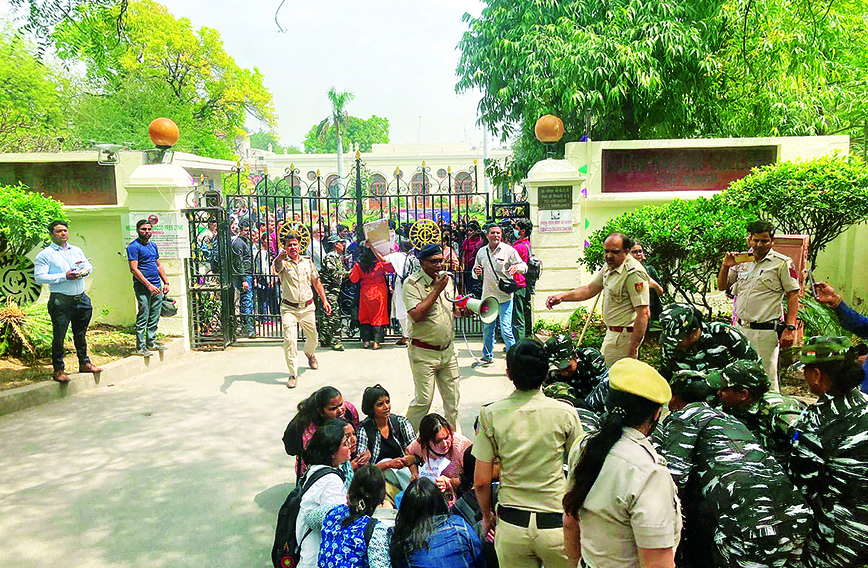
Students protest on campus
Girls fight back after festival is overrun
Kavita Charanji, New Delhi
COLLEGE festivals are supposed to be fun. Exuberant students turn up at their campus to enjoy themselves in a spirt of camaraderie. Or so it should be. But the Indraprastha College for Women’s (IPCW) recent annual cultural festival, Shruti, was a hellish experience for its students.
On March 28, the second day of the festival, a large number of men barged into this women-only campus, scaling walls from all directions — the sportsfields, the hostel and other areas. They seemed to be in thousands, such was the shock they caused.
Girls were groped and abused. One girl was pinned to the floor, while the clothes of another were ripped. When other girls rushed to protect them, the men just laughed, say the girls.
There is a recent trend of Delhi University (DU) women’s colleges becoming targets of sexual harassment during festivals. It happened in Gargi College in 2020 when outsiders had barged in and molested several students. It happened again at Miranda House in 2022 during a Diwali mela when men climbed over its walls and harassed the girls.
Going by this record, IPCW’s principal, college authorities and the Delhi Police should have ensured tight security during the IPCW festival. Instead, the horrific occurrence at IPCW seems to follow a predictable pattern — failure of the authorities to prevent the incident, subsequent denial, trivialization, victimization of the victims, and delayed justice with the culprits not being brought to book speedily.
Nearly three weeks later, Delhi University issued a 17-point advisory to colleges for holding festivals and events. Some of the directives include a mandatory no-objective certificate from the police, entry only to pre-registered students, security drills and CCTVs at all the gates.
When this incident occurred, no FIR was lodged immediately, nor were there urgent calls to the police. The following day, angry student protesters, mostly from the college itself, turned out in large numbers to demand strict action against the culprits. The administration must be held accountable for the trauma they faced, they said.
The principal, Dr Poonam Kumria, dismissed the protests as politically motivated. But IPCW students reiterate that it was they who led the protests and student bodies like the All-India Students’ Association (AISA) and Students Federation of India (SFI) only joined in to express solidarity. “The central point is that the girls were sexually molested. Whose responsibility is it to reassure the students that their voice will be heard, to ensure that an FIR will be filed on behalf of them, if not the principal?” asks a former teacher of the college.
The college authorities claimed that they had written to the police to provide security for an 8,000-plus crowd at the festival. But, it seems, 12,000 online passes were issued.
According to DCP North S.S. Kalsi, however, the college did not send a formal application regarding security. At any rate, no special arrangements were made and a few policemen were sent to be present at the gate.
The Delhi Commission for Women (DCW) which took suo moto cognizance of the incident in its interim recommendations, found glaring lapses. For one, 10 days after the incident senior Delhi Police officials said that CCTV footage had not yet been secured from the college. Summoned again two days later, they said incomplete footage had been provided.
Likewise, though the college authorities had forwarded 231 complaints and representations to the Delhi Police, till April 4, a week after the incident, statements of only two survivors had been recorded under Section 164, CrPC.
There is misogyny in the way the incident has been brushed aside. Says one IPCW student who joined the protests: “Men feel they can barge into women-only spaces and own these spaces. The intruders were sloganeering, shouting, ‘Miranda, IP dono hamara. Miranda nahin choda toh IP bhi nahin chodenge’. They are trampling on our freedom and safety," says a student who took part in the protests.
“We have heard students say that on the day of the incident the principal told the girls to leave the campus and the men would follow. This is such a misogynistic and patriarchal statement to make,” says IPCW alumna Rupal Vaidya.
Vaidya and fellow alumna Kiran Mittal recall that when they were studying in college there were incidents of sexual harassment outside, in buses and so on, but once students entered the gates of the campus they felt very safe. “Over 30 years ago when we were students, the college administration responded to cases of sexual harassment, even those that occurred outside, with sensitivity and alacrity,” says Vaidya.
On the other hand, she points out, today, despite the current regulations to deal with cases of sexual harassment at the workplace and in higher education institutions, there are many lacunae in the way IPCW authorities have implemented them.
For instance, says Vaidya, the IPCW authorities have disregarded the provisions that every college should proactively disseminate information as to what constitutes sexual harassment according to the law. The college is supposed to explain the complaint procedure, whether complaints can be made anonymously and what a college needs to do to inform the Internal Complaints Committee (ICC) about the provisions of the law. There are also guidelines about the composition of the committee which is supposed to be headed by a female presiding officer.
 Police try to disperse protesting girls
Police try to disperse protesting girls
Some days after the IPCW incident, the principal announced that a committee would be set up to look into the grievances. Students were asked to submit their complaints along with proof of misbehaviour to the Administrative Officer of the college on or before April 6.
Despite evidence such as photographs, videos and CCTV coverage, the girls have been asked for evidence. “This is clearly a case of mass harassment and molestation. It is like asking a rape survivor to prove the crime. It is a double-edged sword. If the girls provide evidence, there is the possibility that they will face threats,” says Mittal.
Nor does the IPCW website comply with UGC provisions on other fronts. The college’s website does not have the complete contact details of the mandatory ICC though it lists some names.
In a public notification copied to the IPCW principal, DU announced the setting up of a committee to enquire into the incident. But the committee is to be headed by a male professor. The 2013 Sexual Harassment of Women at Workplace (Prevention, Prohibition and Redressal) Act mandates the setting up of a Prevention of Sexual Harassment Committee (POSH).
The rules state that only an ICC can deal with such cases. The composition of the committee announced by DU also does not comply with POSH terms, which require at least two members with social or legal expertise as well as at least one member from an NGO committed to women’s causes.
What also evokes the ire of the alumnae and former teachers is that counselling is to be given to the traumatized students within a window of three hours a day over a three-day period. “This is laughable. Can this time frame be sufficient? Will the girls get a psychology teacher or a counsellor specially trained in sexual trauma counselling?” asks one former teacher.
Many days after the incident, five students were ‘bound down’ by the police for their role in the IPCW case. In effect, they have to be present for police investigations and cannot leave the city or country without official permission. Another eight DU students have been identified against whom the police plan to take similar action.
The students are not satisfied with the advisory issued by DU. They say their inputs were not considered. Their demand, for student representation on the committee to ensure transparency, has not been conceded as yet.
Comments
Currently there are no Comments. Be first to write a comment!




